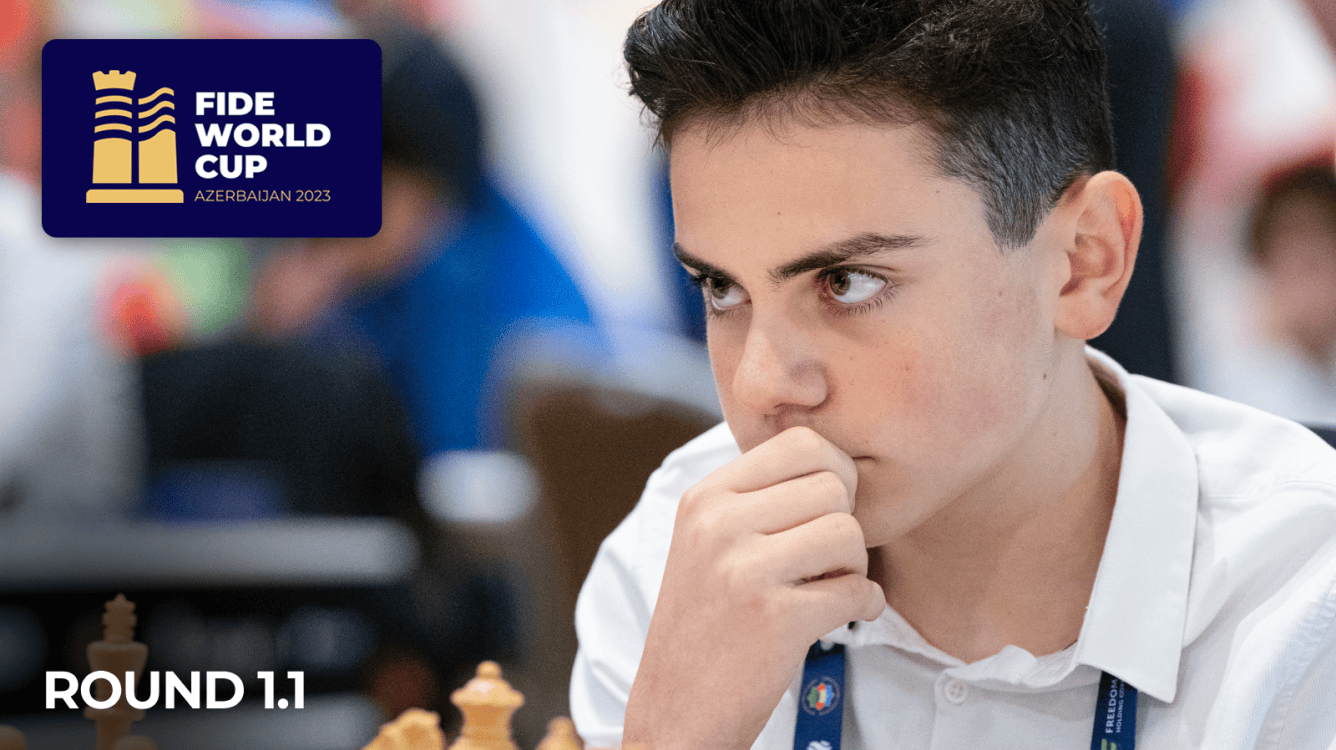
Stunning Start By Ediz Gurel, The World Cup's Youngest Player
Fourteen-year-old IM Ediz Gurel found a brilliant sacrifice to take down GM Velimir Ivic as the 2023 FIDE World Cup kicked off in Baku. Top seeds such as GMs Magnus Carlsen, Fabiano Caruana, Hikaru Nakamura, and Ju Wenjun start their campaigns in Wednesday's round two, but by then the tournament will already be over for 117 players.
Game two of the round-one clashes begins on Monday, July 31, at 7 a.m. ET / 13:00 CEST / 4:30 p.m IST.
- What Is The FIDE World Cup?
- What's At Stake?
- What's New In 2023?
- Who's Playing?
- Who's Missing?
- Open Round 1, Game 1: 14-Year-Old Pulls Off Upset
- Women Round 1, Game 1: Eline Roebers Continues To Shine
What Is The FIDE World Cup?
The FIDE World Cup (206 players) and the FIDE Women's World Cup (103 players) are huge knockout tournaments where each match consists of two classical games of chess followed, in case of a tie, by a third day of rapid and blitz tiebreaks. This year's events are being held in Baku, Azerbaijan, with the action starting July 30 and running until August 24.
The open tournament has been held once every two years in this format since 2005. The defending champion is GM Jan-Krzysztof Duda, with the finalists as follows:
- 2005: 1. Aronian, 2. Ponomariov
- 2007: 1. Kamsky, 2. Shirov
- 2009: 1. Gelfand, 2. Ponomariov
- 2011: 1. Svidler, 2. Grischuk
- 2013: 1. Kramnik, 2. Andreikin
- 2015: 1. Karjakin, 2. Svidler
- 2017: 1. Aronian, 2. Ding Liren
- 2019: 1. Radjabov, 2. Ding Liren
- 2021: 1. Duda, 2. Karjakin
The women's tournament has been held as a Women's World Cup, and not World Championship, only once before, in 2021. GM Alexandra Kosteniuk is the defending champion.
- 2021: 1. Kosteniuk, 2. Goryachkina
The top 50 seeds in the Open section and the top 25 in the Women's get a bye through round one, so they join the action for Wednesday's round two.
What's At Stake?
The combined prize fund is over $2.5 million, with $110,000 for the winner in the Open section and $50,000 for the Women's. For many of the players, however, the goal is to qualify for the FIDE Candidates Chess Tournament 2024 next April in Toronto, Canada. That event will determine who challenges GM Ding Liren and Ju in the next world championship matches, and three of the eight spots in both the Open and Women's sections are up for grabs in Baku. That means the third-place matches may potentially be more significant than the finals.
What's New In 2023?
The format has essentially been the same since 2005, except that in 2021 an extra round was added so that another 78 players in the Open, and 39 in the Women's, got a chance to compete. In 2023 we have the same number of players and prize fund, except for the curious detail that in the Open section the players who lose round one earn $3,000 instead of $3,750.
The main change, however, modifies the tiebreaks that occur on every third day of the event. As before, we have first two 25-minute games, with a 10-second increment per player per move, then, if needed, two 10+10 games, then two 5+3, but this time there's no longer an armageddon decider. Instead the players will play an unlimited number of single 3+2 games until one player wins.
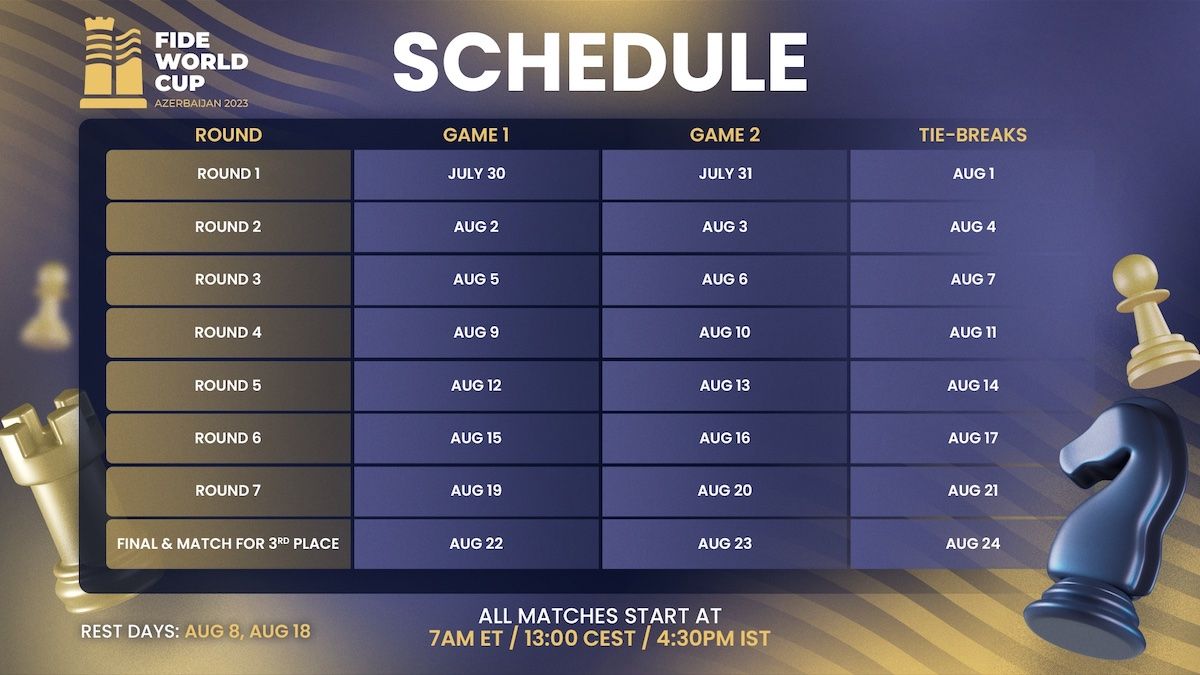
That change is unlikely to affect too many matches—there were just two armageddons in the Open section in 2021, and one in the Women's, but the chaos that game descended into was the perfect illustration of why the change has been made.
No more Armageddon in the Chess World Cup 2023 in Baku! It's been replaced with a sudden-death 3+2 blitz game. What will be the length of the longest match? I'm guessing it'll be 12 games.
— Vasif Durarbayli (@durarbayli) July 23, 2023
Also, what are your thoughts about this change?
BTW, 8 games must be played before the… https://t.co/StGL1wwQQi
One thing we won't have in Baku is a 15-minute anti-cheating delay on the move transmissions. Those involved on the technical side of the event will breathe a sigh of relief at that, though some eyebrows have been raised.
Just read in the regulations for @FIDE_chess World Cup that there will be no broadcast delay in the games transmission. I thought the delay was helpful to the reputation of the game, was quite easy to implement and had minimal drawbacks. Would be happy if I’m proven wrong!
— MVL (@Vachier_Lagrave) July 30, 2023
Who's Playing?
The World Cup has once again drawn a fantastic field, including the world top-three: Carlsen, Nakamura, and Caruana. The potential paths of Carlsen and Nakamura to the final give an indication of the strength in depth. Here's who they would play if the highest-seeded player wins each match.
- Carlsen: R2: GM Levan Pantsulaia (GEO), R3: GM Aryan Tari (NOR), R4: GM Amin Tabatabaei (IRI), R5: GM Wei Yi (CHN), QF: GM Gukesh D (IND), SF: GM Ian Nepomniachtchi (FID), Final: Nakamura (USA)
- Nakamura: R2: GM Karthik Venkataraman (IND), R3: GM Benjamin Gledura (HUN), R4: GM Praggnanandhaa Rameshbabu (IND), R5: GM Liem Le (VIE), QF: GM Teimour Radjabov (AZE), SF: Caruana (USA), Final: Carlsen (NOR)
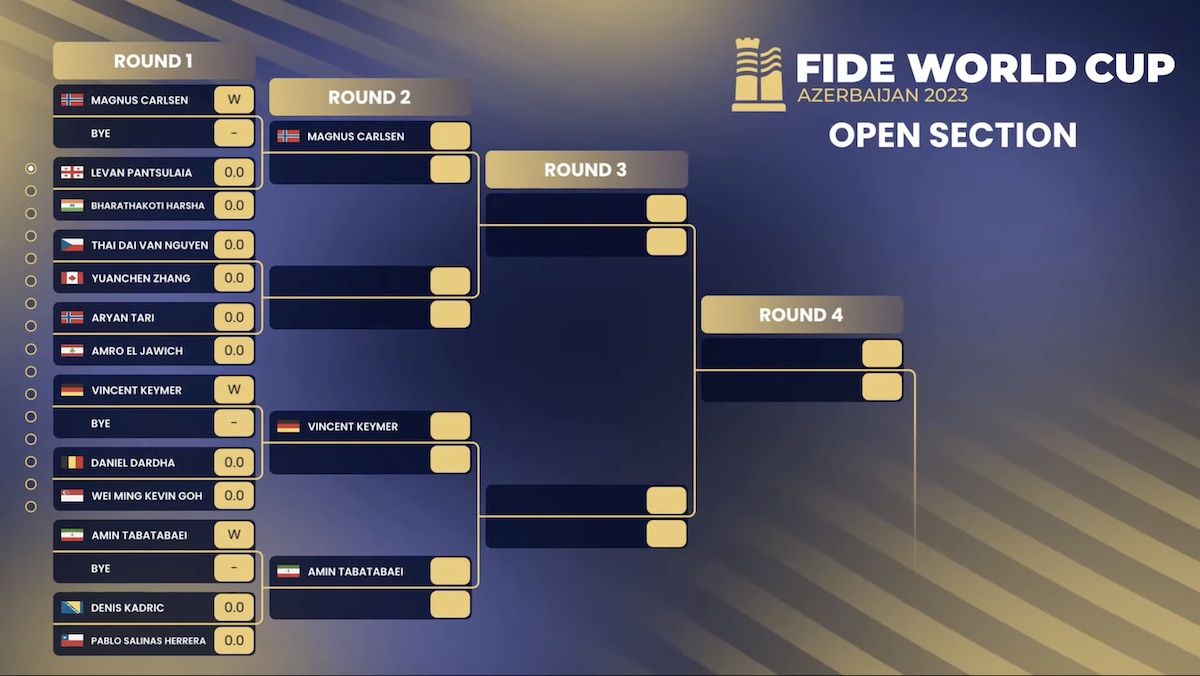
Upsets are to be expected, however, with the World Cup one of the few events Carlsen has yet to win. He reached the semifinals as a teenager, but when he next played a decade later he was knocked out in round three by Chinese GM Bu Xiangzhi, and then in 2021 he lost in the semifinals again, to Duda.
Nakamura, who curiously needed a late FIDE presidential wildcard to play after earlier declining his invitation based on rating, has a career-best record of reaching the quarterfinals, also in Baku, in 2015. This year, he hasn't had long for a honeymoon after getting married.
Meanwhile in Turkey...time to have coffee and play chess! pic.twitter.com/UD4h2i6pPh
— Hikaru Nakamura (@GMHikaru) July 28, 2023
One player who chess fans will be glad to see playing is Ukrainian GM Vasyl Ivanchuk, who also received a wildcard but was then at the center of a curious international incident. A letter from top chess players was published on the FIDE website, pleading for special dispensation for Ivanchuk to be able to leave Ukraine and travel to Baku. Men aged 18 to 60 are in principle unable to leave Ukraine at present, but the six other Ukrainian participants in the Open section were able to take their spots, and it was soon confirmed that Ivanchuk could also travel.
Despite a difficult trip to Baku (17 hours of waiting at the border with Hungary), Vasyl Ivanchuk is in good spirits at the opening of the World Chess Cup #fide #chess #WorldCup2023 pic.twitter.com/hLFXQbYaN4
— Oleksandr Sulypa (@Flycont) July 29, 2023
Vadim Gutzeit, the Ukrainian Minister of Youth and Sports, criticized FIDE for stirring up a fuss about the incident, which, reading between the lines, seems to have been more a bureaucratic failure than a deliberate decision to prevent Ivanchuk from playing.
The Ukrainian Chess Federation did, however, publish "recommendations" on their Facebook page, where they asked Ukrainian players to refrain from shaking hands or taking part in joint photo or video shoots with representatives of Russia and Belarus, "regardless of which flag they represent." That might have an impact on the tournament in Baku, where players listed as Russian on the FIDE rating lists will appear at the board with the "neutral" FIDE flag.
In the 2023 European Championship, Russian GM Mikhail Kobalia appealed after Ukrainian GM Kirill Shevchenko (who now represents Romania) refused to shake his hand before winning their round-seven game. The appeal was rejected, but would the Appeals Committee in Baku reach the same verdict?
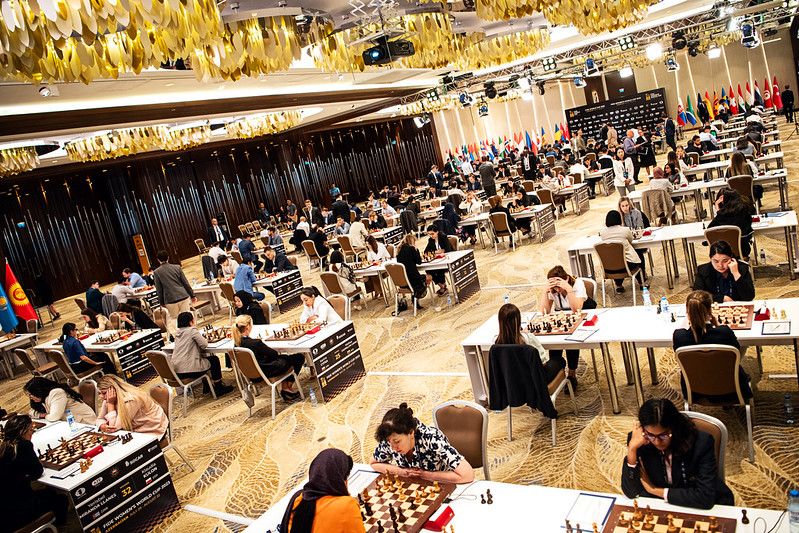
It's noteworthy that six female players from Ukraine are also in action, including the sister GMs Anna Muzychuk and Mariya Muzychuk, who have what for them is a nightmare potential seeding against each other in round four. The women's field is topped by the newly-crowned Women's World Champion Ju, who in 2018 defended her title in a similar 64-player knockout. This time her title isn't on the line, but if she's going to win the $50,000 top prize, this is her potential path:
- Ju Wenjun: R2: IM Eva Repkova (SVK), R3: GM Monika Socko (POL), R4: GM Elisabeth Paehtz (GER), QF: Mariya Muzychuk (UKR), SF: GM Kateryna Lagno (FID), Final: GM Aleksandra Goryachkina (FID)
Goryachkina is the second seed, but defending champion Kosteniuk is also a player to watch.
Who's Missing?
The women's number-one GM Hou Yifan is an unsurprising absentee since she hasn't played chess professionally for several years now, while it's also understandable that GM Lei Tingjie has chosen not to play after a grueling world championship match.
More noteworthy, however, are the missing players in the Open section. For a second World Cup in a row, Ding is missing, as are fellow top-10 star GMs Alireza Firouzja, Viswanathan Anand and Richard Rapport. Anand will be doing commentary and Ding has no interest in the Candidates (except playing the winner in a match), but Rapport and particularly Firouzja's reasoning is less clear.

The 2015 winner and 2021 runner-up GM Sergey Karjakin is absent after claiming he was unwilling to play without a Russian flag at his board.
The other big player missing is the only two-time winner of the World Cup, GM Levon Aronian, who now represents the U.S. but is very much Armenian. He was unwilling to travel to Azerbaijan with the two countries essentially at war, and he's not alone: GMs Gabriel Sargissian, Haik Martirosyan, Shant Sargsyan, Samvel Ter-Sahakyan, Hovhannes Gabuzyan, and Elina Danielian, as well as IMs Lilit Mkrtchian and Anna Sargsyan all declined to play. Aronian proposed he could participate... from Switzerland.
Just an idea , I am willing to play from FIDE office in Lausanne under any supervision necessary. https://t.co/tZLeTqOpQR
— Levon Aronian (@LevAronian) June 7, 2023
His suggestion was shunned, and while it's hard to see how Aronian could have played blitz tiebreaks "remotely," he will be missed. It's doubly unfortunate since he also had to drop out of the 2021 event due to illness.
There are also players who have been unable to take part for more mundane reasons. Canadian GM Eric Hansen tweeted about his woes.
disappointed that I won’t be making it to the World Cup in Baku this year.
— Eric Hansen (@hansenchess) July 28, 2023
my Azeri visa application was delayed more than expected and I had a nightmare experience dealing with Air Canada when I wanted to check in to the flight. pic.twitter.com/YRmhyXfQtB
Sixteen-year-old U.S. GM Christopher Yoo is another notable player who didn't appear on day one.
Open Round 1, Game 1: 14-Year-Old Pulls Off Upset
The first win of the 2023 World Cup was also the highlight of the day, with 14-year-old Turkish prodigy Gurel scoring a spectacular win against 20-year-old Serbian GM Velimir Ivic, who himself had been one of the revelations of the 2021 World Cup. Back then in Sochi, Russia, Ivic scored upset wins against GMs Francisco Vallejo Pons, Matthias Bluebaum, and Dmitry Andreikin, before losing to GM Vladimir Fedoseev only in tiebreaks.
This time 21...Bxc5? was a losing move, though the puzzle, posed by the 15th world champion, is tougher than it first appears.
14 year old Ediz Gürel playing White against Serbian Grandmaster Velimir Ivić. Black has played 21...Bxc5. Can you see White's winning continuation here?#FIDEWorldCup @FIDE_chess pic.twitter.com/1foV3dNYh8
— Viswanathan Anand (@vishy64theking) July 30, 2023
GM Rafael Leitao has annotated the game below.
Gurel explained afterward that he'd prepared until move 18 and, when surprised, knew it meant that his opponent had gone astray: "After that, I knew something was wrong, and I just checked this sac, and it was really working. I had to make sure, and I won the game."
Gurel also mentions that he's "very good friends" with Ivic, though one wonders if the feeling is mutual. Gurel qualified for the World Cup by defeating Ivic in the final round of the European Championship 2023. What drew Gurel to chess? "First of all, I like thinking. This is what I like about chess."
I like thinking! This is what I like about chess.
Ediz Gurel
Although round one featured many strong favorites winning comfortably, there were also upsets, or potential upsets, wherever you looked: 2374-rated Peruvian IM Gianmarco Leiva won a pawn and methodically outplayed 2623-rated GM Anton Demchenko, 2412-rated Iranian GM Pouria Darini defeated 2615-rated GM Ferenc Berkes, and 2407-rated Mongolian IM Ganzorig Amartuvshin scored a crushing win with the black pieces over Spanish GM Eduardo Iturrizaga.
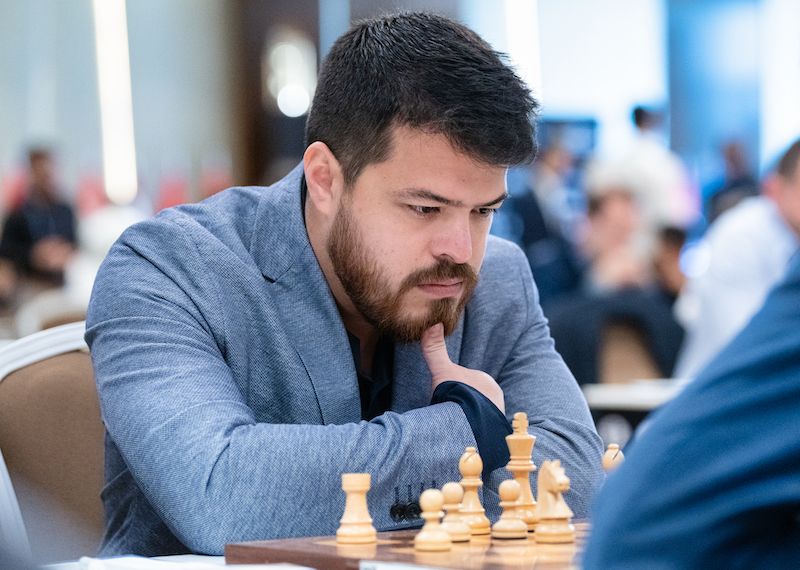
At the critical moment, Iturrizaga got down to just 12 seconds as he tried to react to 35...Nf4!, threatening a knight fork on d3.
Chilean GM Pablo Salinas, who played the game of the day when the 2021 World Cup began, got off to another great start by taking down 123-point-higher-rated GM Denis Kadric from Montenegro.
It wasn't only about wins, with 2180-rated IM Dante Beukes from Namibia giving 2657-rated GM Ivan Saric hell in an absolutely nail-biting game that had the commentators enthralled as time ran out.
Dante Beukes vs. Ivan Saric has been an absolute thriller!#FIDEWorldCup pic.twitter.com/vRWJbHnSJL
— chess24.com (@chess24com) July 30, 2023
Beukes had winning chances, even in the final position, with Saric tempting him to play on by not claiming a draw by repetition even after the position had been repeated three times. In the end Beukes decided to live to fight another day in Monday's return game.

The determination and ingenuity of the higher-rated players were most evident in the play of French GM Jules Moussard, who found himself losing against 431-point-lower-rated Ugandan FM Haruna Nsubuga. Moussard not only didn't lose but ended up a pawn up in an endgame he'd entered with a draw seemingly the absolute maximum he could hope for. The game ended with bare kings on move 109.
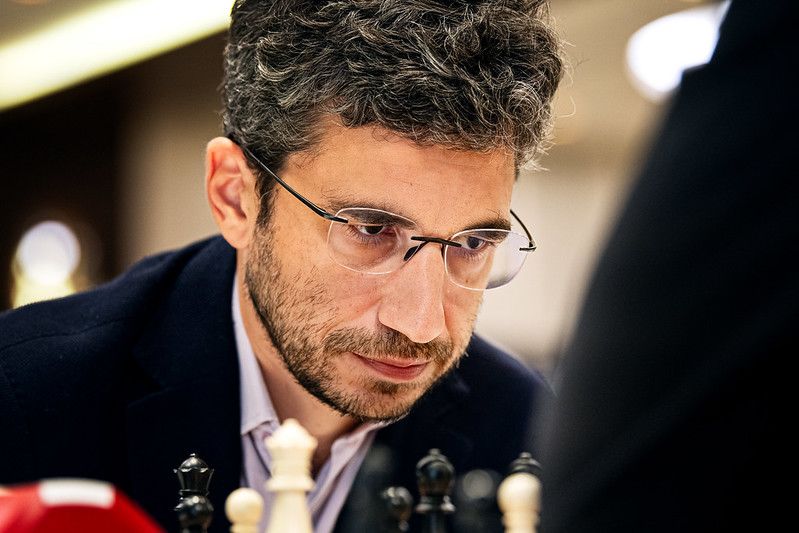
Another Frenchman fared better, with GM Laurent Fressinet scoring a study-like win after his own FM opponent, Massinas Djabri from Algeria, mistakenly swapped off one pair of rooks. A knight and bishop often overpower a rook but not this time!
Fressinet is potentially on a collision course with his nemesis, GM Anish Giri, in round three, with the Dutchman having started his preparation early.
Prep for World Cup in full swing pic.twitter.com/Y9XwqJqhoC
— Anish Giri (@anishgiri) July 19, 2023
Women Round 1, Game 1: Eline Roebers Continues To Shine
In the Women's section, the top-25 seeds sat out round one, which meant that the 26th seed, 17-year-old Dutch IM Eline Roebers, got to sit on the top board. "I thought it was fun!" is how she summed up the experience.
The game helped since she caught WCM Yamama Asif Abdula Al-Fayyadh in the opening and finished things off with a tactic that caught Anand's eye.
Eline Roebers from the Netherlands played this nice tactic 36.Rxd5. 36...Qxd5 loses to 37.Ne7+@FIDE_chess #FIDEWorldCup pic.twitter.com/E41B2OS31q
— Viswanathan Anand (@vishy64theking) July 30, 2023
The Women's event also had upsets, including 25-year-old Brazilian WIM Kathie Goulart Librelato's win over experienced Georgian IM Salome Melia.

Canadian WGM Maili-Jade Ouellet, just 21 years old, got a surprising chance for an upset win after WGM Xiao Yiyi blundered with 13.Nb5??.
13...Rc5! is simply attacking two knights and winning one of them. White stopped and thought 24 minutes before replying with the sad 14.a4, but it was too late.
Perhaps the nicest finish came for Mongolian WGM Turmunkh Munkhzul (2226) against Ukrainian IM and former World Girls Junior Champion Nataliya Buksa.
Nothing is over, however, since Buksa and all the players who lost on day one will have a chance to hit back on day two and force tiebreaks on Tuesday.
Meanwhile the sharks are congregating in Baku, with one of them, Caruana, visiting the playing hall as he celebrated his 31st birthday. That didn't save him from the dress code police!
Happy Birthday to Fabiano! I do expect everyone to follow the dress code as per regulations, once the event begins.
— Anish Giri (@anishgiri) July 30, 2023
The 2023 FIDE World Cup and Women's World Cup in Baku, Azerbaijan, are big knockout events that will determine six spots in the 2024 FIDE Candidates Tournaments. The action begins July 30 and ends August 24, with a combined $2.5 million prize fund.
Previous Coverage



